Georges Pludermacher, piano
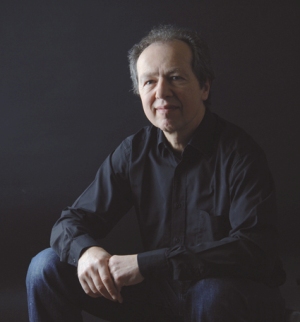 Combining the talent of a prestigious virtuoso with the daring to give performances that are often as original as they are demanding, Georges Pludermacher has today won universal renown as a pianist. He was only three years old when he began to play the piano and only eleven when he was accepted into the Conservatoire National Supérieur in Paris, where he studied under Lucette DESCAVES and Jacques FEVRIER, and later under Geneviève JOY and Henriette PUIG. He won many First Prizes, and quickly added several international awards to the list of his successes: Second Prize in the Competitions of Vianna da Mota and Leeds, and most importantly, the only prize to be given at the Geza Anda Competition in 1979. His solo career quickly led him to perform under the direction of such acclaimed conductors as Sir Georg SOLTI (Chicago Symphony), Christophe von DOHNANNYI (French National Orchestra) and Pierre BOULEZ (at the head of the London Sinfonia). Moreover, he began to show a fondness for chamber music, which he says contributed greatly to his musical development, particularly as a result of his involvement with the violinists Christian FERRAS and Ivry GITLIS, and with his undisputed master, the great Nathan MILSTEIN. Today, Georges Pludermacher enjoys a rewarding collaboration with the Pasquier Trio and the Amadeus Quartet, and the outstanding partnership of Ernst HÄFFLINGER (cycles of Schubert, Schumann and Schönberg), Michel PORTAL, Youri BASHMET and Jean-François HEISSER. A regular guest of the most important festivals both in France and abroad (including Salzbourg, Vienna, Montreux, Aix-en-Provence, Edinburgh, Avignon, Florence, Tours, Strasbourg, Barcelona and Madrid), Georges Pludermacher has become famous for a wide-ranging repertoire that allows him to combine his taste for a challenge with his love of secrecy. Indeed, far from shying away from the obligations of performance, he has both produced innovative and personal interpretations of the great works - the complete Sonatas of Mozart and Schubert - and set great store by internalization and concentration. It was this latter predilection that motivated his performance of Debussy’s Etudes, which earned him the triple acclaim of the Monde de Musique, Diapason and the Grand Prix de l’Académie du Disque, and again his choice of Beethoven’s Diabelli Variations, which won the Grand Prize of the Charles CROS Academy. He has recorded the Beethoven’s complete piano sonatas and piano concertos with Orchestre de Bretagne under the baton of Moshe Atzmon, as well as Schubert, Debussy and Ravel piano works, for the label TRANSART LIVE, during the Flâneries Musicales d’Eté de Reims. While he is thus following a brilliant career as a pianist, Georges Pludermacher remains an artist of many talents. An invaluable guide to the origins of contemporary music (being published in Domaine Musical, Musique Vivante etc), and a great amateur performer of the jazz music in which he can rediscover the ‘inventiveness’ he holds so dear, he also keeps up his work as a teacher (at the C.N.S.M.). Less frequently, but with the same elan and efficiency, he also finds time to write music and participate in debates. An ardent opponent of rigid musical interpretations, this artist brings a unique combination of thoroughness and invention, artistic depth and virtuosity to all the works he performs; he uses the old stylistic qualities of the piano in a new atmosphere of recreation.
Combining the talent of a prestigious virtuoso with the daring to give performances that are often as original as they are demanding, Georges Pludermacher has today won universal renown as a pianist. He was only three years old when he began to play the piano and only eleven when he was accepted into the Conservatoire National Supérieur in Paris, where he studied under Lucette DESCAVES and Jacques FEVRIER, and later under Geneviève JOY and Henriette PUIG. He won many First Prizes, and quickly added several international awards to the list of his successes: Second Prize in the Competitions of Vianna da Mota and Leeds, and most importantly, the only prize to be given at the Geza Anda Competition in 1979. His solo career quickly led him to perform under the direction of such acclaimed conductors as Sir Georg SOLTI (Chicago Symphony), Christophe von DOHNANNYI (French National Orchestra) and Pierre BOULEZ (at the head of the London Sinfonia). Moreover, he began to show a fondness for chamber music, which he says contributed greatly to his musical development, particularly as a result of his involvement with the violinists Christian FERRAS and Ivry GITLIS, and with his undisputed master, the great Nathan MILSTEIN. Today, Georges Pludermacher enjoys a rewarding collaboration with the Pasquier Trio and the Amadeus Quartet, and the outstanding partnership of Ernst HÄFFLINGER (cycles of Schubert, Schumann and Schönberg), Michel PORTAL, Youri BASHMET and Jean-François HEISSER. A regular guest of the most important festivals both in France and abroad (including Salzbourg, Vienna, Montreux, Aix-en-Provence, Edinburgh, Avignon, Florence, Tours, Strasbourg, Barcelona and Madrid), Georges Pludermacher has become famous for a wide-ranging repertoire that allows him to combine his taste for a challenge with his love of secrecy. Indeed, far from shying away from the obligations of performance, he has both produced innovative and personal interpretations of the great works - the complete Sonatas of Mozart and Schubert - and set great store by internalization and concentration. It was this latter predilection that motivated his performance of Debussy’s Etudes, which earned him the triple acclaim of the Monde de Musique, Diapason and the Grand Prix de l’Académie du Disque, and again his choice of Beethoven’s Diabelli Variations, which won the Grand Prize of the Charles CROS Academy. He has recorded the Beethoven’s complete piano sonatas and piano concertos with Orchestre de Bretagne under the baton of Moshe Atzmon, as well as Schubert, Debussy and Ravel piano works, for the label TRANSART LIVE, during the Flâneries Musicales d’Eté de Reims. While he is thus following a brilliant career as a pianist, Georges Pludermacher remains an artist of many talents. An invaluable guide to the origins of contemporary music (being published in Domaine Musical, Musique Vivante etc), and a great amateur performer of the jazz music in which he can rediscover the ‘inventiveness’ he holds so dear, he also keeps up his work as a teacher (at the C.N.S.M.). Less frequently, but with the same elan and efficiency, he also finds time to write music and participate in debates. An ardent opponent of rigid musical interpretations, this artist brings a unique combination of thoroughness and invention, artistic depth and virtuosity to all the works he performs; he uses the old stylistic qualities of the piano in a new atmosphere of recreation.
| GEORGES PLUDERMACHER | DISCOGRAPHY | |
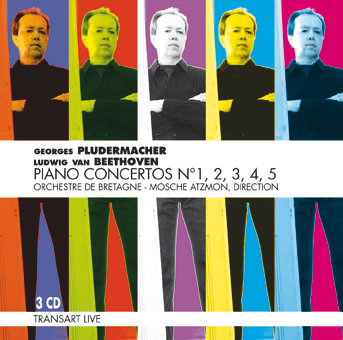 |
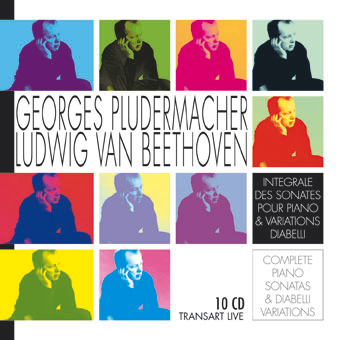 |
|
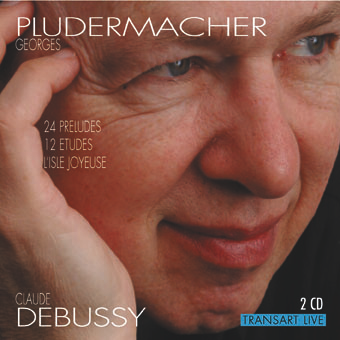 |
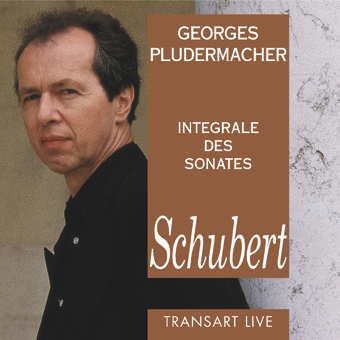 |
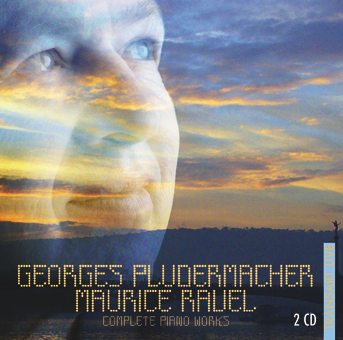 |
MORE ABOUT
GEORGES PLUDERMACHER
Biography in French
« L’écouter est à la fois jouissance intellectuelle, leçon de structuralisme, et découverte qu’au sein des pires difficultés un pianistes peut encore, et de tous ses doigts, chanter ». LE MONDE
« Son jeu, outre l’agilité, la puissance, montre de ces qualités dont on pense a priori qu’elles sont le propre des « instinctifs », des « intuitifs » : la beauté de la sonorité et du cantabile, à peu près unique en France, le goût du timbre, l’élégance de la diction, le panache, le sens dramatique et, surtout, une rythmique électrisante. Mais Pludermacher joue les Bartók les plus trépidants sans bouger la tête. Là où les autres trépignent, il fait de la musique. Dans ces superpositions rythmiques qui demandent aux deux mains (et aux deux esprits) une indépendance diabolique, chaque note tombe en plein dans le mille : c’était écrit…Comme tous les grands rythmiciens, il ne pense pas au rythme : mais la pulsion est implacable, et le tempo toujours naturel. La vraie virtuosité, le vrai talent pianistique se voient à d’autres traits : dans l’unité sonore d’un passage lent, dans la faculté de maintenir la tension, qualités que Pludermacher possède au plus haut degré. Mais c’est aussi, pour les doigts comme pour l’imagination, la possibilité de réaliser des figures contradictoires ; à cet égard il est unique. Par exemple : jouer très vite, détaché, et pianissimo à la fois ; jouer des accords répétés sans alourdir la sonorité ; faire en sorte qu’un trait d’octaves, martelé par d’autres, passe comme une caresse ; donner l’impression, dans la puissance extrême, d’en avoir de reste ; enfin, réaliser un équilibre parfait entre ces éternels frères ennemis : le détaché et le lié. C’est alors qu’apparaît le Signe, le signe de ce que Liszt appelait la « virtuosité transcendante ». Jacques DRILLON – extrait du NOUVEL OBSERVATEUR
« ….Ce fut le même déferlement de musique analysée avec la plus extrême finesse, traitée de la manière la plus subjective mais la plus raisonnable, jouée avec le goût et la sensibilité les plus attachants. Pludermacher a jonglé avec tout cela comme bien peu de maîtres du clavier peuvent le faire… ». Gérard MANONI – QUOTIDIEN DE PARIS
« Georges Pludermacher est un pianiste puissant et sensible ». NEW YORK TIMES
« Georges Pludermacher possède un sentiment heureux de l’équilibre entre la compréhension analytique et la spontanéité émotionnelle ». WIENER ZEITUNG
« …Ce pianiste donne toujours l’impression de dominer totalement ce qu’il joue, mais cette domination intellectuelle ne se fait jamais sentir aux dépens d’une sensibilité frémissante et d’un pouvoir de communication qui fait qu’avec Vladimir Horowitz, il a été le partenaire préféré de Nathan Milstein ». Alain Lompech – LE MONDE DE LA MUSIQUE
Valmalete Swiss . Via alla Chiesa 3 . CH-6934 Bioggio/Lugano . Switzerland | Phone: +41 91 605 65 06 | eMail: info@valmalete.ch | www.valmalete.ch
